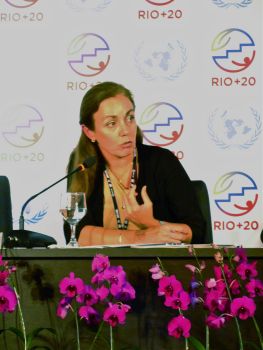By Stephen Leahy
RIO DE JANEIRO, Jun 15 (TerraViva) – Poor countries that green their economies will lift millions of their citizens out of poverty and generate higher incomes while protecting invaluable natural ecosystems, says a report released here in Rio Thursday.
Some developing countries are actively pursuing a transition towards low-carbon, resource-efficient economies, it found.

Kitty van der Heijden, ambassador for sustainable development in the Dutch ministry of foreign affairs. Credit: Stephen Leahy/TerraViva
“Our message is that economy and ecology can be brought together for the greater benefit of all people, but especially the poorest,” said Peter Hazlewood, director of Ecosystems and Development at the World Resources Institute (WRI), and co-author of the report “Building an Inclusive Green Economy for All”.
“This transition will not be easy. It will require new policies, targeted investments and reforms of government institutions,” Hazlewood said.
Governmental departments like agriculture, environment and economic development that rarely talk to each other will have to be integrated and learn to work together, he told TerraViva.
“If we can’t get this right, we will be in big trouble,” Hazlewood warned.
The report offers an example by integrating 26 organisations under the Poverty-Environment Partnership network that includes bilateral aid agencies, development banks, U.N. agencies and international environmental NGOs.
It was presented during the Rio+20 Summit on Sustainable Development here, where more than 130 world leaders and as many as 50,000 people are participating in events expected to set targets and map out pathways for achieving sustainable economic development that addresses not only poverty, but ecological limits.
“We are finally working together to address development, equity and environment,” said Kitty van der Heijden, ambassador for sustainable development in the Dutch ministry of foreign affairs.
Major investments are and will be made in the rapidly growing countries of the developing world, and those investments need to be green, otherwise they will be locked onto the old unsustainable pathway. Replacing all that unsustainable infrastructure will be hugely expensive, as industrialised countries now realise, said van der Heijden.
In Lagos, Nigeria, public-private partnerships to improve the city’s infrastructure, reduce congestion and upgrade slums have helped create around 4,000 environment-related jobs among unemployed youth, the report found.
Mongolia’s first 50-megawatt wind farm is currently under construction and is set to generate an estimated five percent of the county’s electricity needs, while reducing air pollution linked with coal-fired generation.
Simply protecting natural habitats offers huge benefits as well. Rio de Janeiro, with more than six million people, gets most of its high-quality drinking water from nearby forests, saving billions of dollars in costs related to water treatment plants. The same is true for cities like Bogotá and Cape Town.
The report shows that a green economy that brings benefits for all is possible and it offers the science-based evidence to policymakers so they can take action. It also shows there will be losers in the transition and it is important to identify and protect those that need it, said van der Heijden.
“Rio+20 is not a landing pad for sustainable development. It can be the launching pad,” she said.







 Add to Google
Add to Google








Pingback: Another Week of GW News, June 18, 2012 [A Few Things Ill Considered] - Dennis Flint High CountryDennis Flint